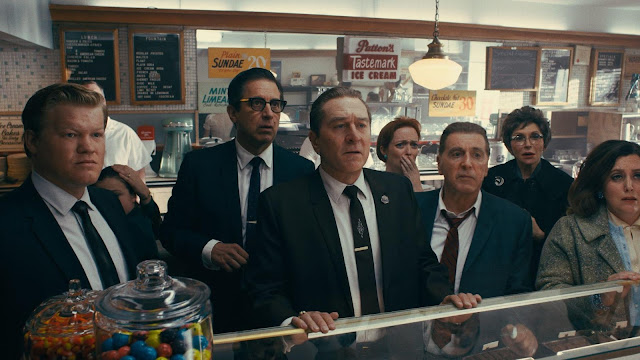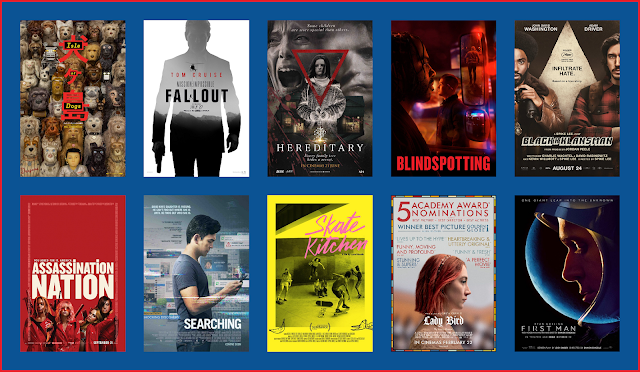The Irishman Review
(A version of this article originally appeared on kernelnow.com / mynewslike.com)
Like cellular devices or DVDs before it, video streaming is now a part of life. Ever since services evolved into the arena of original content, film-makers have argued that they threaten the existence of big screen cinema – and they may have a point.
It’s interesting, then, that Martin Scorsese – famed film lover, historian and beloved director – would lend his work to streaming giants Netflix. Perhaps it was their supporting this long-gestating passion project, or maybe it’s just that he and his films, even in the 52nd year of his career, continue to stare down the cinematic status quo.
Whatever the case, through the studio’s $159 million backing Scorsese has finally been able to put together The Irishman. This latest crime epic follows Robert De Niro in the title role as Frank Sheeran, who rises to become mob hitman AND confidant/guard for famed but forgotten Teamster, Jimmy Hoffa (Al Pacino). Most surprisingly of all is that this very Scorsesean tale has been allowed an exclusively theatrical debut, 26 days before its streaming release.
 |
| The only thing that rivals the length of the film is its ambition - and perhaps its cast (source: Netflix) |
Most of the incoming buzz (and budget) for the film focused on the large-scale appearance manipulation of not just De Niro and Pacino, but Scorsese regulars Joe Pesci and Harvey Keitel, centering largely on the “de-aging” of these icons. As if to immediately address this intrigue, the film showcases the work of its digital artists early on, allowing the audience to quickly acclimatize. Thankfully, apart from an episode of curbside intimidation where off-screen age hampers the physical performance, these transformations are largely smooth. However, whilst many have spoken about the quality of these youthful shifts, there are actually frequent instances where the leads are shown at advanced elderly ages – arguably the more impressive alterations, proving better challenges to the acting capabilities of those involved.
Perhaps it is the demands presented by this process or perhaps it’s just Scorsese’s directorial skill, but The Irishman brings out some of the finer dramatic turns of these actors’ recent careers. The two leads particularly thrive: as Hoffa, Pacino gives his most animated performance since Any Given Sunday, delivering a similar swagger and arrogant humor to Tony D’Amato. He’s a perfect foil for De Niro’s deliberate Sheeran, whose decades-spanning portrayal runs from unanticipated youthful earnest to surprising fragility in the winter of his character’s life. There’s even a degree of Travis Bickle-esque comedy as he navigates history like a dark Forrest Gump – though inevitably, he easily transforms into the ice cold dispatcher of souls on a regular basis.
Of course, this is all born of the story, one which takes the same
slow-burning origin-to-supremacy journey that is commonplace in
Scorsese’s crime films. Yet where this differs from Goodfellas or The Wolf of Wall Street is in its epilogue; though – MILD SPOILER ALERT
– there is the central comeuppance that those films offered, the
now-elder statesman Martin Scorsese has experience in surviving through
to the twilight of one’s career. He presents this here, and like a
gangster’s Once Upon a Time in the West mortality and death are
examined as more than that which is found at the end of a gun. This
reflection may come to rank among the most autobiographical entries into
the director’s canon.
 |
| Through Sheeran (De Niro), director Martin Scorsese reflects on the past (source: Netflix) |
Unfortunately, there’s no getting around one element of this opus: the runtime. Netflix have allowed Scorsese the freedom to adapt Charles Brandt’s I Heard You Paint Houses as he sees fit, and both sides should be commended for the rich level of context and methodology that such commitment has allowed.
But this is a film aimed squarely at the pre-existing Scorsese fan base.
In recently defending his critique of superhero cinema, the director commented that for he and his New Hollywood peers, the work of Alfred Hitchcock “was our franchise. Every new Hitchcock picture was an event.” The same is now true for his films, with the fortunate but limited big screen release here showcasing the need for a built-in audience. This isn’t entry-level Scorsese, and one must have already devoted many hours to his back catalogue to truly enjoy it. Assured and aware that his viewers will now seek him out and not vice-versa, the director delivers exactly what he wants to see. This is admirable, of course, but there must surely be some question over whether this is born of belief in his undeniable abilities, or comfort in a guaranteed freedom.
 |
| Pacino and De Niro (l-r) once again prove as much a powerhouse pair on-screen as off (source: Netflix) |



Comments
Post a Comment